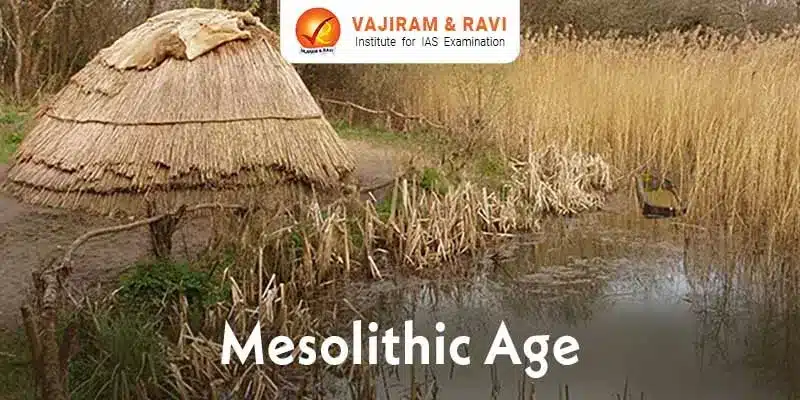The Mesolithic, also known as the Middle Stone Age, was a prehistoric period that fell between the Neolithic (New Stone Age) and Palaeolithic (Old Stone Age), which were distinguished by their polished stone tools and chipped stone tools, respectively. This period, which in India lasted from around 10,000 to 4,000 B.C., is distinguished by the emergence of microliths, which are tiny stone tools with blades.
Mesolithic Age of Prehistoric Period
Around 10,000 years ago, the Pleistocene geological era gave way to the Holocene, giving way to the Mesolithic Age. During this transition, many environmental changes occurred, and specific climate profiles exist for some subcontinent regions. Microliths are extremely small tools that people began to make and use, according to prehistorians. This Mesolithic Age of the Prehistoric Period ended with the introduction of agriculture (beginning of the Neolithic Age).
- Climate:
- The phase is of variable length, depending on climatic factors like rising temperatures, warm and dry climates, and impacts on human life and fauna.
- Economy:
- The Mesolithic people continued to survive through hunting and gathering, but there occurred a change in the pattern of hunting from big animals in the Palaeolithic period to smaller animals that could be taken out with the aid of bows and arrows.
- Also, hunting and fishing gained relevance.
- Their long interaction with nature made them hunters and gatherers for specific species. Thus, they preferred a few species of animals and plants over others.
- Tools: Microliths were the distinctive features of this age. They were called so because the tools used were chipped stone tools with a limit of length from under 1 cm to 5 cm.

- The technique to make microliths was punch and pressure on the harder materials like agate, chalcedony, flint carnelian, etc.
- Microliths were geometric (trapeze, triangle, lunate, or crescent) as well as non-geometric shapes.
- Microliths also include small versions of some upper palaeolithic tools, such as burins, points, and scrapers.
- Their small size indicates that they were used as composite tools and were made of wood or bones.
- Macroliths, the larger tools, were also used. These were in the form of axes and picks and a continuation of the Upper Palaeolithic tools, such as scrapers.
- Bone and antler tools were also used.

Way of Life
- Camps and houses: The Mesolithic people were migratory in nature. They migrated in pursuit of food from plants and animals.
- In addition to using caves and rock shelters, they constructed makeshift huts.
- There has been the discovery of circular huts with potholes as well as burnt clay lumps bearing reed impressions.
- There are paintings inside a lot of caves and shelters.
- Images of circular huts can be found on rocks.
- Perishable materials were used to construct the makeshift huts.
- There are traces of circular and oval huts, as well as what may be wattle daub, in Bagor and Tilwara in Rajasthan and Chopani Mando and Damdama in Uttar Pradesh.
- Burials: The fact that the Mesolithic people buried their dead suggests something about their beliefs and humane relationships.
- In the Indian states of Mahadaha, Damdama, and Sarai Nahar Rai, skeletons of people have been discovered. A male and a female were buried together at Mahadaha.
Mesolithic Age in India
In India, Mesolithic cultures started around 10,000 BCE. In some parts of India, such as Kerala and Tamil Nadu, Mesolithic culture continued up to 1000 BCE, until the beginning of the Iron Age. Barring the Northeast, Mesolithic sites are found throughout India.

- Sites: Rock shelters in Mirzapur were the first excavated Mesolithic sites. Major excavated sites in India are:
- Tilwara, Bagor, and Ganeshwar in Rajasthan
- Langhnaj, Akhaj, Valasana, Hirpura, Amrapur, Devnimori, Dhekvadlo, and Tarsang in Gujarat
- Patne, Pachad, Hatkhamba in Maharashtra
- Morkhana, Lekhahia, Baghai Khor, Sarai Nahar Rai, Mahadaha, Damdama, Chopani Mando, Baidha Putpurihwa in Uttar Pradesh
- Pachmarhi, Adamgarh, Putli Karar, Bhimbetka, Baghor II, Baghor III, Ghaghariain Madhya Pradesh
- Paisra in Bihar
- Kuchai in Odisha
- Birbhanpur, West Bengal
- Muchatla Chintamanu Gavi and Gauri Gundam in Andhra Pradesh
- Sanganakallu in Karnataka
- Tenmalai in Kerala
Mesolithic Age UPSC PYQs
Question 1: Mesolithic rock-cut architecture of India not only reflects the cultural life of the times but also a fine aesthetic sense comparable to modern painting. Critically evaluate this comment. (UPSC Mains 2015)
Last updated on April, 2025
→ UPSC Notification 2025 was released on 22nd January 2025.
→ The UPSC Vacancy 2025 were released 1129, out of which 979 were for UPSC CSE and remaining 150 are for UPSC IFoS.
→ UPSC Admit Card 2025 is expected to release in first week of May for CSE Prelims Exam 2025.
→ The UPSC Prelims 2025 is scheduled to be conducted on 25th May 2025 and UPSC Mains 2025 will be conducted on 22nd August 2025.
→ Apply once through it and aspirants can apply for various government exams conducted by UPSC.
→ The UPSC Selection Process is of 3 stages-Prelims, Mains and Interview.
→ UPSC Result 2024 is released with latest UPSC Marksheet 2024. Check Now!
→ UPSC Toppers List 2024 is released now. Shakti Dubey is UPSC AIR 1 2024 Topper.
→ Also check Best IAS Coaching in Delhi
Mesolithic Age FAQs
Q1. What is the Mesolithic Age?+
Q2. What are microliths?+
Q3. What were the tools used in the Mesolithic Age?+
Q4. Which technology was used during the Mesolithic era?+
Q5. What are the Mesolithic sites in India?+
Tags: mesolithic age in india quest















